Church of the Brethren Newsline
April 14, 2017

“You who fear the Lord, praise him! …For he did not despise or abhor the affliction of the afflicted…. All the ends of the earth shall remember and turn to the Lord” (Psalm 22:23a, 24a, 27a).
Good Friday 2017 coincides with the third anniversary of the Chibok abductions, and comes on the heels of Palm Sunday bombings of Coptic Christians in Egypt, and repeated cycles of military action in Syria. Today’s news carries reports of violence, famine, and other life-threatening occurrences in numerous places around the world. When Brethren gathered around the love feast table yesterday evening, doubtless many prayers were said for the struggles of sisters and brothers near and far. It seems a fitting day for Newsline to offer a special issue focused on a few of these struggles, as well as glimpses of resurrection hope and new life.
1) Action Alert for the third anniversary of the Chibok kidnappings
2) Global Mission and Service executive visits Chibok during recent trip to Nigeria
3) Church of the Brethren gives grants to rebuild Nigerian churches
4) Remembering Chibok at Mt. Vernon Nazarene University
5) Carrying the cross without fear: How the Coptic Church in Egypt deals with the constant threat
6) Love feast at Princeton
**********
Quote of the week:
“This Holy Week in Iraq, Christians and Muslims will walk for 140 kilometers through the Nineveh Plain in the name of peace and the end of violence in a once mostly Christian inhabited area. The peace march is supported by the Chaldean Patriarchate, which declared 2017 as ‘The Year of Peace.’ … An estimated 100 people from Iraq and other countries are expected to walk through these historic lands. During the week-long journey, participants will pray for the rebirth of these abandoned towns as well as for peace and for the will to overcome all forms of violence.”
— From a Vatican Radio report of April 10. The peace march was to start in Ankawa in northern Iraq, after a Palm Sunday Mass, and end in Qaradosh, close to the ruins of the ancient Assyrian cities of Nimrud and Nineveh and just 32 kilometers from Mosul, the report said. Find it at http://en.radiovaticana.va/news/2017/04/10/christian_and_muslims_in_iraq_march_together_for_peace_/1304646 .
**********
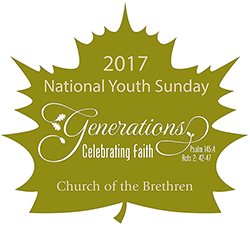
A note to readers: National Youth Sunday, May 7, is an opportunity to involve youth in leading worship in congregations across the Church of the Brethren. This annual special Sunday is sponsored by the Youth and Young Adult Ministry and Congregational Life Ministries. The theme for 2017, “Generations Celebrating Faith” (Psalm 145:4 and Acts 2:42-47), connects with the observance of May as Older Adult Month and this fall’s Inspiration 2017–National Older Adult Conference (NOAC). Worship resources for May 7 and a high resolution version of the logo are free to download from http://www.brethren.org/yya/national-youth-sunday.html . More about connecting the generations in May will be include in next week’s Newsline.
**********
1) Action Alert for the third anniversary of the Chibok kidnappings
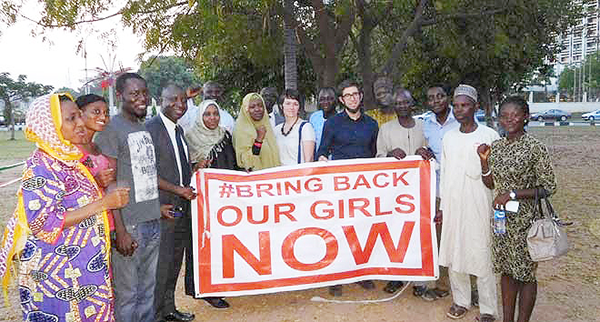
From the Office of Public Witness
Remind your representatives that is has been three years since the Chibok girls were kidnapped and that the food crisis in Nigeria continues.
On April 14, 2014, 276 Chibok girls were abducted by the terrorist group, Boko Haram. As of now, 195 girls continue to be held. We recognize that not only is this Friday the third anniversary of the girls kidnapping, but also Good Friday, a day where we reflect on both suffering and hope. Countless Nigerians have suffered at the hands of Boko Haram. We wish for hope through humanitarian aid and more government attention for Nigeria in this dark time of an even broader humanitarian crisis.
The 2014 Church of the Brethren Annual Conference statement, “A Resolution Responding to Violence in Nigeria,” states, “The circumstances in Nigeria have come to the attention of the world, and to our attention as Brethren. Sisters and brothers of Ekklesiyar Yan’uwa a Nigeria (EYN, the Church of the Brethren in Nigeria) suffer kidnappings, bombings, mass killings, and burning of churches and homes. Despite the global awareness, the violence has continued at an alarming rate. EYN leaders have asked for fasting and prayer for the plight of the church and the people of Nigeria.”
We urge continued focus and broad humanitarian response.
Make a phone call or write a letter to your representatives using the following template for inspiration.
Hello,
I am _______ from ________ and a member of the Church of the Brethren. I am calling because I deeply feel for my sisters in Nigeria who, on April 14th, will have been missing for three years.
The Church of the Brethren has been in Nigeria since the early 1920s with now more than a million members in the Northeast and has contributed nearly $5 million to fund crisis response projects.
On April 14, 2014, 276 Chibok girls were abducted by terrorist group, Boko Haram. We celebrate that some girls have been released, but more action is needed.
Why isn’t the United States government doing more to address the girls kidnapped by Boko Haram?
We urge continued focus on the emerging famine and an increase in accessibility for broader humanitarian response.
I would be interested in talking about this further with one of your staffers who works on these issues. My phone number is: ____ My address is: _________ My e-mail address is: _______
Look up your legislators here: www.brethren.org/publicwitness/legislator-lookup.html .
— Emerson Goering is peacebuilding and policy associate at the Church of the Brethren Office of Public Witness in Washington, D.C. Action Alerts come out periodically identifying advocacy actions related to Annual Conference statements. To receive alerts by e-mail go to www.brethren.org/publicwitness/legislator-lookup.html .
2) Global Mission and Service executive visits Chibok during recent trip to Nigeria
Video from Chibok. Posted by Church of the Brethren Global Mission on Thursday, April 13, 2017.
By Jay Wittmeyer
April 14, Good Friday, marks the third year since the brutal abduction of 276 girls from the Government Girls Secondary School in Chibok, Borno State, Nigeria. The Church of the Brethren has been praying for the girls very specifically since the event occurred and we request you continue to pray. To the best of my understanding, there are currently 197 girls still missing and, I believe, many of these are still alive.
I went to Chibok last week. The security is extremely tight, and there is little space to do much, but I felt compelled to go along with three brothers from Ekklesiyar Yan’uwa a Nigeria (EYN, the Church of the Brethren in Nigeria): Marcus Gamache, Dr. Yakubu Joseph, and the district secretary of Chibok. It was partially for my own understanding, partially to encourage EYN, and more specifically, the local Brethren families who continue to live and farm in Chibok.
Chibok is just over an hour’s drive from Kwarhi, the national headquarters of EYN, and the location of the conference hall where we were attending the 70th Majalisa or annual conference of EYN.
During the Majalisa, EYN president Joel Billi “tasked the federal government to expedite action in rescuing the remaining Chibok girls abductees to keep them steadfast in the Christian faith,” as reported in Nigeria’s Leadership News. He was quoted in the national newspaper saying that EYN would not relent in praying for the safe return of the girls and for their parents, and urging a presidential committee to redouble efforts to fast track the rebuilding of places of worship destroyed by the insurgency ( http://leadership.ng/news/580669/cleric-urges-fg-to-expedite-action-on-release-of-chibok-girls#respond).
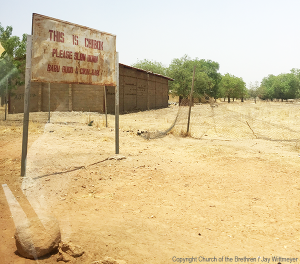
The road from Kwarhi to Chibok is paved through Uba and into Askira, but it then turns toward the Sambisi Forest and it is unpaved and rough into the market village of Chibok. The Nigerian Security Forces have a strong presence in the town and area, and we could only enter with permission. We were not given access to visit the secondary school.
We visited two churches in Chibok: a church on the outskirts, which is in the process of building a much larger building–to my amazement; and EYN No.2 in the center of Chibok where some 100 children were lined up and marching in the boy’s and girl’s brigades [Nigerian equivalent of boy scouts and girl scouts]. The brigades act as watchdogs, informing the community if they are being attacked.
We also visited the home of the EYN district secretary, and met his wife and several families who resettled with him because they were unable to stay out in the surrounding villages.
The Chibok Bible School of EYN is still open and continues to train pastors at the certificate level. There are 13 students at the Bible school and two lecturers. Throughout the town there are water shortages, especially at the Bible school. A water harvesting system was in disrepair.
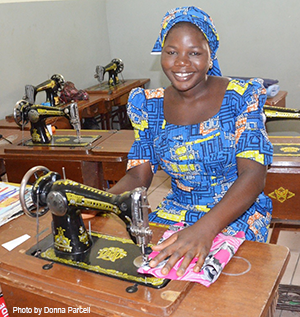
We spent our longest time with an old Brethren family. The father was baptized in 1958 by Gerald Neher, a Church of the Brethren mission worker, and was trained as a lab technician. We met his family and grandchildren. At one point, the family had to flee from Chibok for six nights and hide in the bush. A second time they left for two nights. Other than that, he and his family have been staying and praying and farming. His family had a good harvest this past year, which included 30 bags of groundnuts [peanuts].
In talking with the Nigerian security personnel, we learned that many have been stationed in Chibok for more than eight tense years. I cannot share the details of their stories, but it was moving to understand how deeply they have been suffering. One soldier asked for a Bible, which we promised to send.
I came away even more burdened to pray for the missing girls, but also encouraged that there is a Christian witness in Chibok. The Nigerian Brethren have maintained their witness, in spite of it all. Last year, 21 of the abducted schoolgirls were released, and asked to be baptized. We pray for the remaining girls.
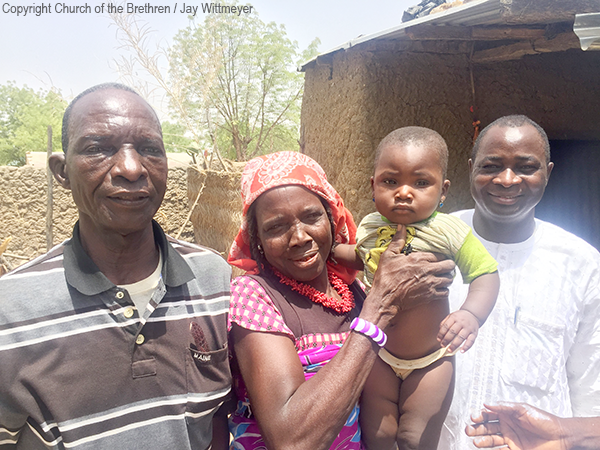
— Jay Wittmeyer is executive director of Global Mission and Service for the Church of the Brethren. For more about the Nigeria Crisis Response, a joint effort of the Global Mission and Service and Brethren Disaster Ministries with Ekklesiyar Yan’uwa a Nigeria, go to www.brethren.org/nigeriacrisis .
3) Church of the Brethren gives grants to rebuild Nigerian churches
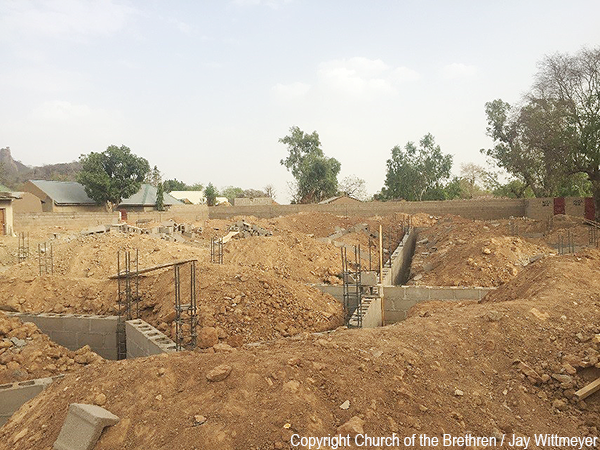
By Jay Wittmeyer
The Church of the Brethren has granted $100,000 to Ekklesiyar Yan’uwa a Nigeria (EYN, the Church of the Brethren in Nigeria) to support the church rebuilding efforts of EYN members. The grants will be given to 20 churches at $5,000 a piece.
Following is the initial list of Local Church Councils (LCC) receiving these grants, listed under their District Church Councils (DCC):
— In DCC Biu: LCC Kwaya Kusar
— In DCC Shaffa: LCC Shaffa No. 1
— In DCC Kwajaffa: LCC Tashan Alade, LCC Kirbuku
— In DCC Gombi: LCC Gombi No. 1, LCC Gombi No. 2
— In DCC Mubi: LCC Giima, LCC Lokuwa
— In DCC Gashala: LCC Bakin Rijiya
— In DCC Uba: LCC Uba No. 1, LCC Uba No. 2
— In DCC Whatu: LCC Whatu
— In DCC Vi: LCC Vi No. 1
— In DCC Michika: LCC Michika No. 1, LCC Lughu
— In DCC Askira: LCC Askira No. 1, Askira No. 2.
— In DCC Gulak: LCC Gulak No. 1.
— In DCC Ribawa: LCC Muva
— In DCC Bikama: LCC Betso
The leadership of EYN set several criteria in managing the grants. It excluded areas that are still too volatile to safely rebuild, including Gwoza, Chibok, Wagga, and Madagali. It decided to support the rebuilding of bigger churches, so that once they are rebuilt, they would in turn be able to support the rebuilding of the smaller churches. Some churches in Borno State may be rehabilitated through funds from the state.
For smaller churches, the $5,000 will purchase a roof of metal and tin, while the walls can be constructed with local materials.
The Church of the Brethren has two primary mechanisms for fundraising for Nigeria: the Nigeria Crisis Fund, which is directed toward humanitarian relief; and the Church Rebuilding Fund, which assists EYN to rebuild its churches.
— Jay Wittmeyer is executive director of Global Mission and Service for the Church of the Brethren.
4) Remembering Chibok at Mt. Vernon Nazarene University
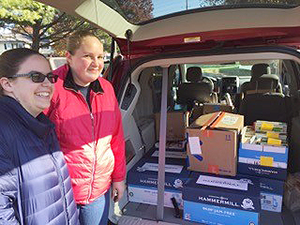
By Pat Krabacher
For the third year in a row, Kristie Hammond of Olivet Church of the Brethren in Ohio–now a senior at Mt. Vernon Nazarene University (MVNU)–arranged for a social justice speaker to commemorate each passing year of the Chibok abductions. She says she was personally affected by this horrific event because the girls were her age, or younger, and were kidnapped for trying to get a post-secondary education just as she is doing.
Of the original 276 girls taken from the Government Girls Secondary School in Chibok, Nigeria, on April 14, 2014, 193 girls are still missing. Inaction by the Nigerian government to search for and rescue the girls who are still missing is now at odds with the perceived interference by the Nigerian government in the lives of the 83 Chibok girls who have escaped. Of those who have escaped, 57 escaped during the first night and day of the abduction. The 26 who escaped or were freed since May 2016 have been under the equivalent of house arrest.
My husband, John Krabacher, and I were the invited speakers for the third annual MVNU event to remember the Chibok schoolgirls. We showed slides and told stories from the August 2016 Fellowship Tour through northeast Nigeria, the Pegi Workcamp to rebuild one of the destroyed EYN churches this January, and our two-day visit to EYN Wulari, Maiduguri Local Church Council (LCC) camp for IDPs (internally displaced people) in Borno State on Feb. 8-10 this year. We included slides highlighting Chibok and the schoolgirls. A verbal report on Chibok town was shared based on the most recent visit by Jay Wittmeyer, executive director of Global Mission and Service for the Church of the Brethren.
Twelve young women asked probing questions ranging from “Who is Boko Haram?” to “Are any Muslims fighting the Boko Haram?” A handout of a March 18 article written by Dionne Searcey and Ashley Gilbertson of the New York Times, titled “Beneath Mask of Normal Life, Young Lives Scarred by Boko Haram,” helped us answer questions as it vividly describes the lives of children and teens abducted by Boko Haram ( www.nytimes.com/2017/03/18/world/africa/boko-haram-nigeria-child-soldiers.html ).
We closed the 90-minute gathering with a prayer circle, where we offered heartfelt prayers for all of the abducted, for those waiting for the return of a missing loved one, for Nigeria, for education to overcome the evil that was intended by Boko Haram, and even for the insurgency fighters. Tears where shed and eyes were opened to the tragedy that is still happening in northeast Nigeria.
When we pray for someone or something, we should be compelled to take action, to be a voice for the voiceless, or to do something good. Our hearts remember the 276 of Chibok and their families, along with the thousands of others now trying to pick up the pieces of shattered lives and communities destroyed.
— Pat Krabacher is a Brethren Volunteer Service worker serving in the Nigeria Crisis Response. Find out more about the response effort at www.brethren.org/nigeriacrisis .
5) Carrying the cross without fear: How the Coptic Church in Egypt deals with the constant threat
By Katja Buck, from a World Council of Churches release
The brutal attacks on two churches in Alexandria and Tanta on Palm Sunday, with more than 40 victims, are not the first attacks on Christians in Egypt. In January, the so-called Islamic State declared a threat against Coptic Christians and killed eight. In December 2016, a blast at the Cathedral in Cairo killed 30 people.
How to deal with this constant threat? And how to avoid the hatred that grows between Christians and Muslims? The Coptic Church has had an answer of sorts for 2,000 years: martyrdom–a forgotten idea in most parts of the world.
In the interview below, Coptic Bishop Thomas explains why the concept of martyrdom has a lot of answers for life in the 21st century.
Question: The topic of martyrdom reoccurred in February 2015 when 21 young Copts were killed by the so-called Islamic State in Libya. People in the entire world were disgusted by the horror the terrorists provided through their professionally made video on the seacoast. The common reaction in the West was not to watch the video in order to keep the dignity of the victims. Christians in Egypt did the opposite. They watched the video ’til the end. Why?
Bishop Thomas: They shared the suffering with those who were beheaded. And suddenly they observed, that, at that moment when the knives were going to cut their heads, the young men pronounced the name of Jesus. Some days later the Coptic church declared them officially as martyrs of the church.
Question: In social media at that time a lot of people in Egypt rejoiced. Icons on the tragedy at the seacoast were created. This is a behavior that Westerners can hardly understand. Aren’t Copts afraid? Don’t they feel angry or threatened?
Bishop Thomas: Don’t think that we don’t mourn! When something like this happens to innocent people there are a lot of tears. But in martyrdom there is both at the same time: the pain of the cross and the joy of salvation. Just take the example of Mary, the Mother of God. She had to give her child, but she rejoiced in God. This is what Christians in Egypt feel.
Question: Don’t they hate those who killed the 21 or who do other harm to Christians?
Bishop Thomas: When there is such a tragedy we always tell people not to be afraid of those who kill. Yes, they can take the body but what else can they do? They can’t take the eternal glory. When you are not afraid, you are able to love, to forgive, and to show strength. Don’t forget that the story of the 21 young men in Libya started long before that day at the seacoast. They were kidnapped, they were tortured and threatened in an attempt to change their faith. But what these men did was pray and lift their eyes all the higher. When you turn your eyes higher, things on earth appear smaller.
Question: But isn’t this a psychological trick? You promise to a person something which is outside of this world. But this person is killed here in this world. It’s traumatizing for those who stay behind. Parents lose their kids, kids lose their parents and they must continue their lives without their beloved.
Bishop Thomas: Yes, it’s very traumatizing. And when you are with a person who has lost his or her beloved in an attack you don’t find any words to say. I once met a woman who had witnessed the murder of her sister years ago. For this she left Egypt and emigrated to New York. Her husband found a job and everything seemed to be fine. But the husband was working in the World Trade Center just the day of the 9/11 attacks. This woman lost twice a beloved person for the same hatred. In front of her, I didn’t know what to say. There are no words in such a situation. It’s traumatizing.
Question: But the mother of two of the 21 murdered was interviewed by the TV and said that she forgave, that she was praising God who gave strength to her sons to stay strong in faith–I can hardly understand how a mother can forgive those who killed her two sons.
Bishop Thomas: She knows that her sons are dignified. Of course, this doesn’t take away her pain. It’s a trauma despite everything. And therefore, a special trauma healing program is needed. But carrying the suffering doesn’t mean carrying hatred. And expressing pain and suffering doesn’t mean that I’m afraid. God doesn’t want us to throw us away. But when we are exposed to martyrdom we accept it. On the other side martyrdom is always linked to injustice. When there is martyrdom this means that there is injustice. And this calls us who stay alive to do everything to establish justice. We have the responsibility to work for justice. These brutal murders must be stopped.
Question: What does the church do for those who have lost their beloved in attacks against Christians?
Bishop Thomas: First, we take care of the families, spiritually and financially. The loss of a family member can mean a financial disaster for those who stay alive. If we don’t answer these needs we will extend the injustice. Second, we do trauma healing and pastoral care as much as we can to make the families feel that they are not alone in their grief. Then the church is working for human rights. This becomes a necessity and a need. And finally, we ensure that love must be ensured among people. Everyone is in the circle of love and forgiveness, even the murderers. Our fight is a spiritual fight. We are fighting with philosophy and principles.
Question: What does forgiveness mean?
Bishop Thomas: Forgiveness is an act between an individual and God, not between two individuals. The offender is not involved in this first step. Forgiveness means that I don’t allow hatred and fear in my heart. This is necessary for the second step: to create peace and reconciliation. We call for justice and we pray for the persecutors that they will understand and be enlightened by the truth of humanity.
Question: For two years the Western world has been experiencing the rise of terrorism. In Paris, Berlin, Nice or London innocent people were killed for no reason. What could be the answer of the churches in the West? They don’t have the concept of martyrdom in their theology.
Bishop Thomas: The fear is invading the Western society. This is the purpose of terrorism. But the message of fear must be stopped. This could be a strong answer of the churches. If fear is ruling a society the idea of generalization can easily take over. When there are some Muslims who kill Christians it’s easy to feel that all Muslims are bad. But this is unjust. The answer on martyrdom can’t be injustice.
Question: The mentioned mother and the 21 who were killed by the so-called Islamic State haven’t had high education. They were ordinary people, not theologians, they didn’t go to university. How did they get to know how to integrate this philosophical concept of martyrdom in their lives?
Bishop Thomas: They were simple people and lived a simple life. But they were brought up in the spirit of martyrdom where the veneration of the saints plays a significant role. This gave them a profound spiritual base. A simple faith doesn’t need a lot of explanation. In our Sunday schools we don’t teach a written theology but a living theology. There are many examples in the history of the Coptic church where people were martyred but died in dignity. Perhaps the 21 were remembering Saint George who was tortured for seven years and who died as a hero. He was killed but kept his dignity. Or Saint Irenaeus whose father Polycarpus was martyred. The son wrote on the death of his father that he died with dignity. I’m sure that the 21 had in mind that dying in dignity matters. Or take the example of Dolagie in the third century. Her five sons were martyred while she was threatened to deny Christ. Imagine, their children were slaughtered on her lap! Everyone in the Coptic church knows a lot of images, stories and sayings on martyrs. Martyrdom is planted in the heart of the Christians in Egypt from day one. And we all know that it’s a history that is still alive.
Question: The concept of martyrdom seems to be logical in a context of persecution. What happens when there is no persecution anymore? Does this inevitably mean that the idea of martyrdom loses its meaning and its function?
Bishop Thomas: The Western churches may not need to be crucified to understand the meaning of martyrdom. But they can help us to carry the cross like Simon in the Bible. He wasn’t asked whether he is willing to carry the cross of Jesus. He was grabbed out of the crowd and forced to carry the cross without knowing the blessing in it. To carry the cross could be a blessing for the Western churches. Our responsibility to work for justice goes beyond nations, borders and political belongings. The martyrs are sending a cry. The question is whether we want to listen to it or not.
— Katja Dorothea Buck is a German political and religious scientist working on the topic of Christians in the Middle East for more than 15 years. Bishop Thomas is the Bishop of the Coptic bishopric of Al-Quosia, Upper Egypt. He is also the founder of the Coptic retreat center Anafora, which is located between Alexandria and Cairo. The interview was done on March 26, and originally published by the World Council of Churches (WCC).
6) Love feast at Princeton
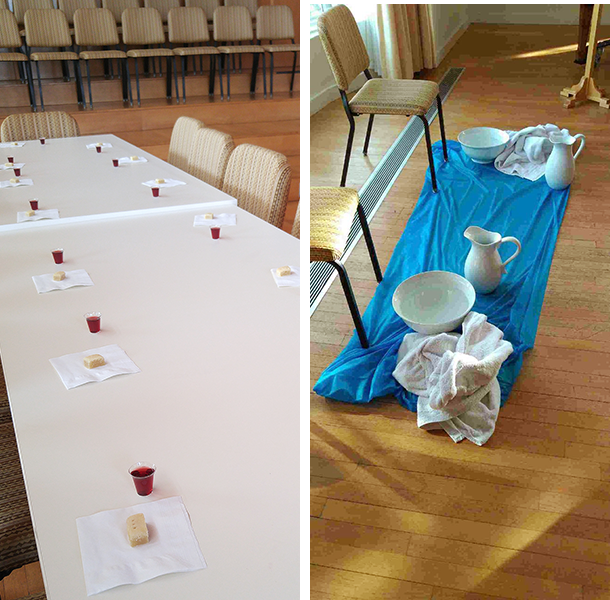
By Paul Mundey
Last month, I received an invitation to officiate at a love feast at Princeton Theological Seminary, where I am a visiting scholar. Surprised to learn there would be a love feast at Princeton, I jumped at the chance to help, but discovered the date conflicted with my responsibilities as a trustee at Bridgewater (Va.) College.
Eager to still participate, I offered to supply the communion bread, made from the vintage Brethren recipe. I also was eager to learn of the origins of the love feast at Princeton, and discovered that Christina Manero was the visionary for the event.
As Christina tells her story, although she now identifies as Mennonite, “it was at a Church of the Brethren congregation that I was first exposed to love feast. I had always wondered why Christians don’t observe feetwashing more often, and here were Christians who made it their practice! Love feast was one of my favorite experiences in that church and when I arrived at seminary I realized few people knew about it or Anabaptism in general. So when I organized the love feast, I tried to bring what I love about the tradition I am now a part of to my new community.”
She says, “Feetwashing was what I most wanted to introduce to people, simply because I think the practice of it and the memory of Jesus doing the same is so powerful.”
Reflecting on the Princeton Love Feast held April 5, Christina notes, “People seemed to really enjoy the whole experience. We had a time of reflection/confession, feetwashing, a fellowship meal, and communion. Each section was accompanied by hymns and scripture readings. We had a nice mix of Anabaptists and non-Anabaptists, so there was good discussion over the fellowship meal regarding what Anabaptists believe, why they do love feast, and so forth. Overall, I was blessed by the service and believe those in attendance were as well.”
By the way, she added, “The bread…was great!”
The Princeton Love Feast is yet another reminder of the relevance of our heritage, and the desire, of a growing number to discover another way of being the church.
— Paul Mundey is an ordained minister in the Church of the Brethren. Recently he retired from the full-time pastoral ministry, having served for 20 years as senior pastor of Frederick (Md.) Church of the Brethren. He is currently a visiting scholar at Princeton Theological Seminary. Find his blog at www.paulmundey.blogspot.com .
**********
Contributors to this issue of Newsline include Jan Fischer Bachman, Katja Dorothea Buck, Emerson Goering, Nate Hosler, Pat Krabacher, Christina Manero, Paul Mundey, Russ Otto, Jay Wittmeyer, and editor Cheryl Brumbaugh-Cayford, director of News Services for the Church of the Brethren. Contact the editor at cobnews@brethren.org . Newsline appears every week, with special issues as needed. Stories may be reprinted if Newsline is cited as the source.
Go to www.brethren.org/Newsline to subscribe to the Church of the Brethren Newsline free e-mail news service and receive church news every week.